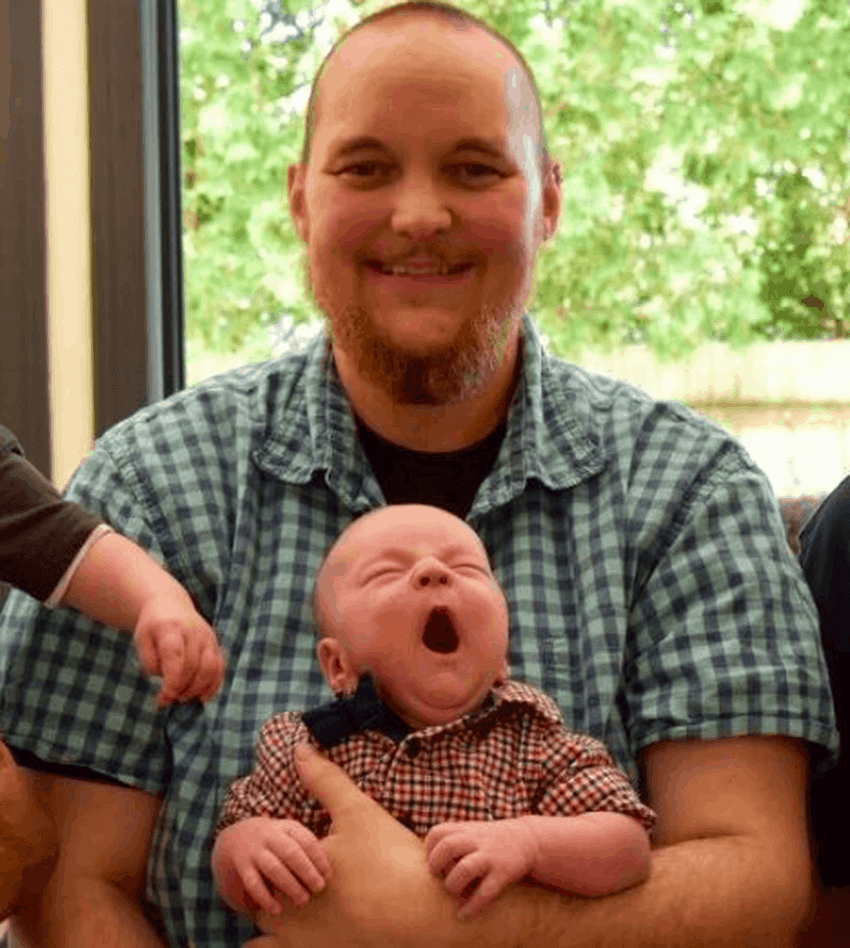⏱️ Estimated Reading Time: 7 min read
[et_pb_section bb_built=”1″][et_pb_row][et_pb_column type=”4_4″][et_pb_button _builder_version=”3.11.1″ button_text=”Biblical Gender and Sexuality: An Expose On Manhood and Womanhood” url_new_window=”on” button_url=”https://servantsofgrace.org/wp-content/uploads/2018/08/BiblicalGenderandSexualityAnExposeontheAuthorityofScripture.pdf” /][et_pb_text _builder_version=”3.11.1″]
A 2016 issue of Time Magazine featured an essay by Jessi Hempel telling the heart-wrenching story of her brother, Evan, giving birth to a son. That sentence might catch you off guard. (If it didn’t, maybe read it again, a little slower!) The photo the story features shows what looks like a man breastfeeding an infant son. Titled “My Brother’s Pregnancy and the Making of a New American Family”, Hempel recounts how her sister underwent a female-to-male transition at 19, but still desired to give birth—and did so at 35.
She describes the long-ago transition that included testosterone injections, producing thick hair over her sister’s knuckles. At that time, Evan elected not to have breast-removal surgery, thus making possible what is called “chest-feeding”. The story is not without several painful admissions. Recounting how much they once looked alike, Hempel laments the loss of her sister’s feminine appearance. And at one point, Hempel observes that Evan, while pregnant, experienced a “traumatizing disconnect between his masculinity and the female attributes of his body”.
She asks a question that helpfully frames how Christians should begin thinking about the transgender revolution: “What if you are born into a female body, know you are a man, and still want to participate in the traditionally exclusive rite of womanhood? What kind of man are you then?” That question touches on a quest we all know: the search for resolution and satisfaction, for a life of equilibrium, without heartache or alienation or disconnect.
It’s understandable that Evan would assume that it’s only by following our feelings that we can find this. Understandable, but incorrect, as Evan—according to Jessi’s article—discovered through personal experience. Evan found in life what we find in Scripture: you don’t break free from the effects of the fall by following the course of the fall in your own life and decisions. Is there hope for individuals like Evan? Can those who face the same kind of struggles find wholeness, and experience psychological relief, bodily relief, and emotional relief? Given the reality of the fall, is there good news for us, regardless of what brokenness each person experiences, regardless of what identities we embrace? Yes!
The Bible’s message to the person struggling with gender-identity issues is the same for the person struggling with envy or depression or anything else:
If anyone is in Christ, he is a new creation. The old has passed away; behold, the new has come (2 Corinthians 5:17).
Here is the offer God holds out to every single one of us: you can be a new creation. To become a new creation in Christ does not mean the world we live in or the bodies we inhabit, or the minds we think with will be totally freed and completely healed. The Spirit does work to renew our minds and change our hearts. But to be a new creation in Christ is to experience the promise of what fully awaits those who place their trust in Him—to be able to anticipate the certainty of a coming day when the disorder of creation is put back together, and when dysphoria of any kind is replaced by euphoria of every kind. To be a new creation is to know why the world is the way it is, why our bodies are the way they are, and why our minds think as they do. It is to be equipped with the power of God’s Holy Spirit to live in relationship with God. A new creation in Christ recognizes that even in broken minds living in broken bodies, living in a broken world, there is a definitive and clear “very good” blueprint of creation.
In the new creation, there will no longer be sadness or death. Brokenness will be no more. The cancer and the tsunamis that plow over humanity—GONE:
Then I saw a new heaven and a new earth, for the first heaven and the first earth had passed away, and the sea was no more. And I saw the holy city, new Jerusalem, coming down out of heaven from God, prepared as a bride adorned for her husband. And I heard a loud voice from the throne saying, “Behold, the dwelling place of God is with man. He will dwell with them, and they will be his people, and God himself will be with them as their God. He will wipe away every tear from their eyes, and death shall be no more, neither shall there be mourning, nor crying, nor pain anymore, for the former things have passed away” (Revelation 21:1-4).
This promise is what Evan is searching for. What Evan and everyone who is transgender are looking for—and what everyone who thinks they may be transgender and everyone who knows they are not are looking for—is a way to make their mind’s perception, their heart’s desires, and their body’s construction “match”—to feel wholeness, rather than dysphoria. And that’s exactly what the gospel promises—not by us seeking to transition from one sex to another (which is impossible), but by waiting; not by us tearing up the blueprint rebelliously, but by living faithfully and patiently, even though it’s painful, until one day there will be transformation. Unlike the partial, frustrating, and ultimately unfulfilling and conflicting transformations that the world offers, this is real, joyful, complete and fulfilling transformation. This is what the Christian is waiting for:
We await a Savior, the Lord Jesus Christ, who will transform our lowly body to be like his glorious body, by the power that enables him even to subject all things to himself (Philippians 3:20-21).
How brilliant it is to think of God one day saying to the person with gender dysphoria who waited faithfully, “Well done. I know it’s been so hard. It’s over now. I love you so much that I have brought you to a place where who you feel you are, and who you truly are, are completely enmeshed. There will be no more pain or crying for you anymore. What you longed for—to feel like, look like, and be the same person—is reality. I know it’s been painful. It won’t be now. Well done, faithful follower.”
We live in a Genesis 3 world, with a Genesis 1 blueprint, on the trajectory to a Revelation 21 future. The question that Evan’s sister wondered aloud about—the question of contentment, joy, and self-acceptance in place of the disconnect—is a question that plagues every human heart. The culture around us answers those questions with a million different and conflicting responses. Christians have only one answer to give, but it is all the answer anyone needs, and it is an answer that we must continue to believe in and hold out: Jesus came and died and rose in order to offer you his Spirit today, and to offer you the life you are searching for in the future.
The Lord Jesus, and the future He offers, make sense of the suffering in and around us now; and His Spirit strengthens anyone, no matter how hard their life is, to struggle on with joy now, knowing that what is to come for Jesus’ family is what they most want to experience—the glory and peace of perfection:
For I consider that the sufferings of this present time are not worth comparing with the glory that is to be revealed to us (Romans 8:18).
Jesus is where we find what we are looking for. The Christian answer is not a restrictive command, but a better story: a story that actually works.
*This article was adapted from the book, God and the Transgender Debate, by Andrew Walker (The Good Book Company, 2017).
[/et_pb_text][/et_pb_column][/et_pb_row][/et_pb_section]




